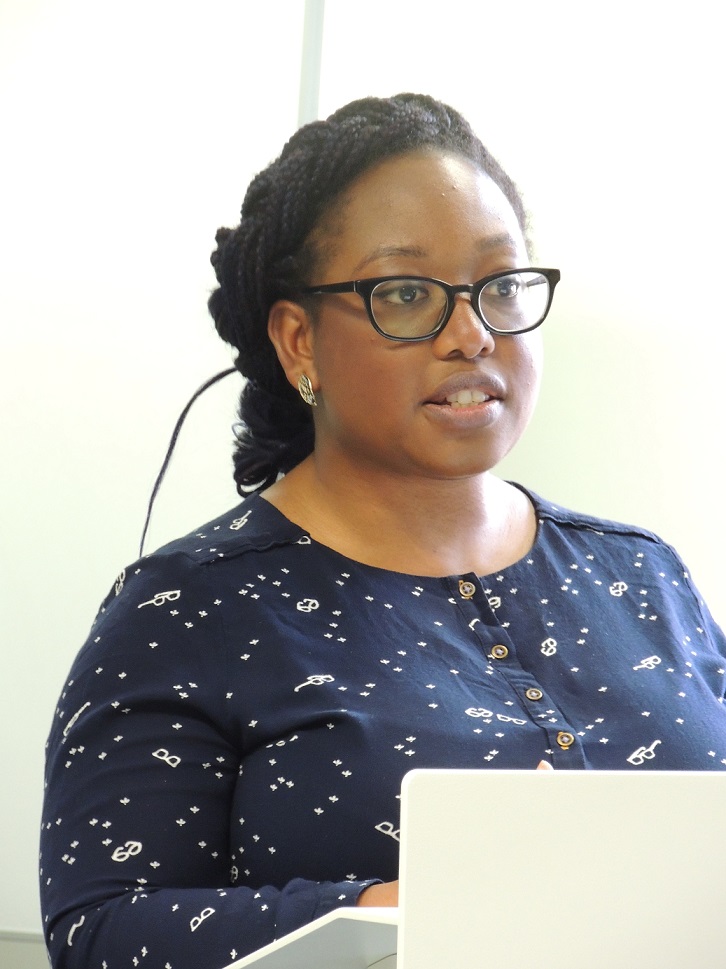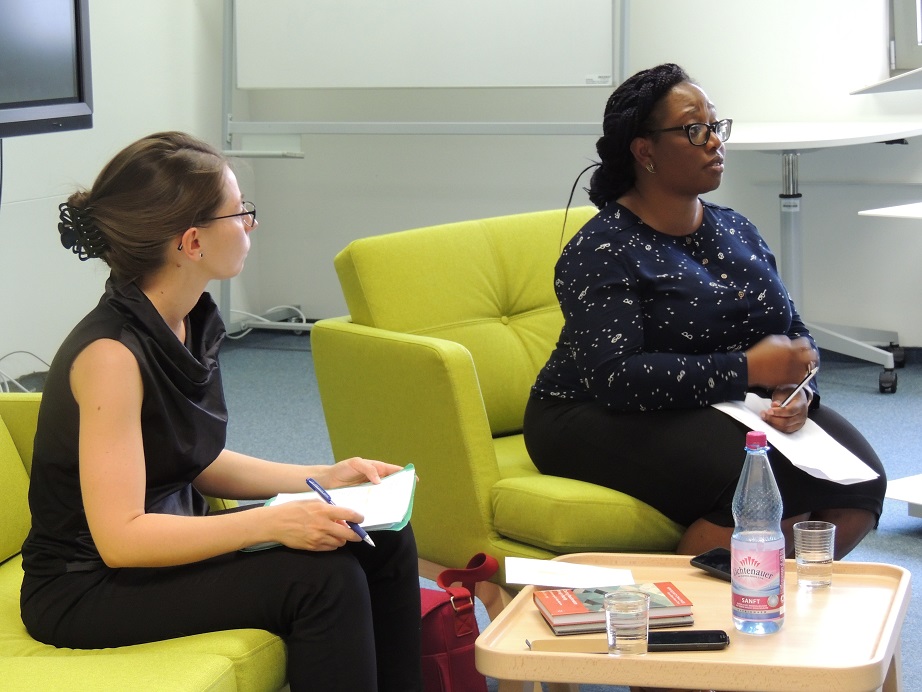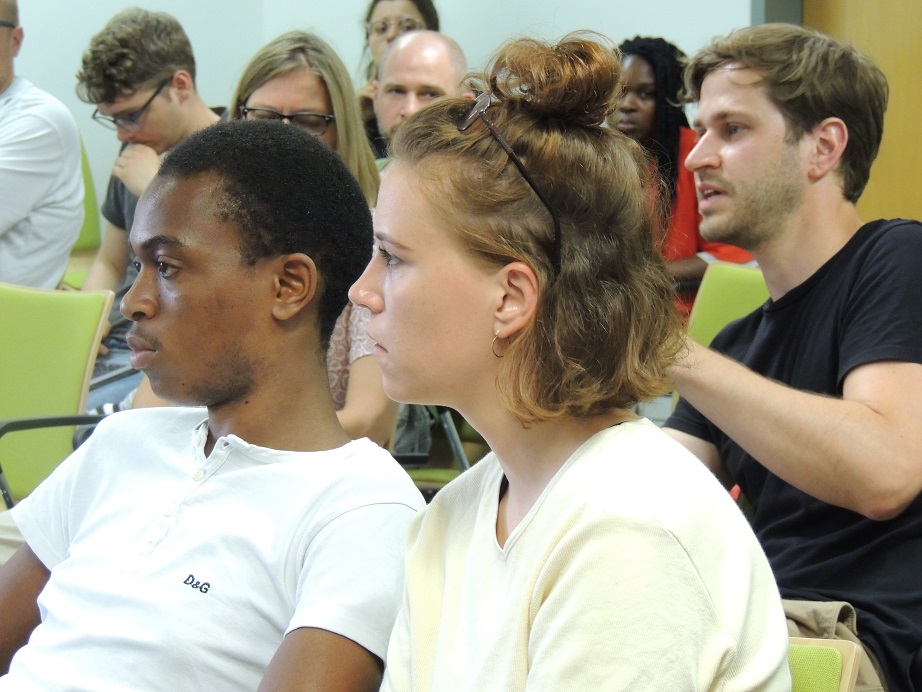Searching for the Women Peace and Security Agenda in Inter-Regional Sites
Toni Haastrup (U Kent)
Publication Date
June 2018
Language
English
Type
Media
Blog Author
Prof. Dr. Toni Haastrup
On Wednesday, 30 May 2018, Dr. Toni Haastrup (U Kent) spoke at our weekly colloquium on the relationship between the European Union (EU) and the African Union (AU), in particular regarding peace and security in Africa. The evening commenced with her presentation on inter alia AU-EU inter-regionalism, the evolution of EU foreign relations towards Africa, as well as the gendered dimension of peace and security policies. Afterwards, Katharina Döring (Project B07, SFB 1199, Leipzig U) engaged her in a panel interview to deepen some of these aspects before opening up for the general discussion. As the significance of the Women Peace and Security Agenda within the inter-regional relations between the EU and AU emerged as one of the focal points during the discussion, we invited Toni Haastrup to recall her main arguments regarding this timely topic in a contribution to our blog.
Searching for the Women Peace and Security agenda in inter-regional sites
by Toni Haastrup

The gendered dynamics of (in)security can no longer be ignored, and regional security institutions are well positioned to address these intersections of gender, security, and peace within the broader global security architecture. Often, this intersection is manifested in the commitment to implement the Women Peace and Security (WPS) agenda. The WPS agenda is significant as it has allowed civil society activists and feminists to question the exclusion of women and women’s experiences, while advocating for their inclusion in the quest for peace globally. In respective regional security institutions, like the African Union (AU) and European Union (EU), the commitment to the WPS agenda ostensibly features as a priority of the work they do. Unsurprisingly then, this same commitment is parroted in the context of cooperation arrangements between regional security institutions.
Yet, particularly within the AU-EU security relationship, there is minimum attention to the gender justice concerns raised by the WPS agenda. Certainly, this relationship allows the EU to exercise its security actorness while providing the majority support via the AU to African peace and security. But, what it also does is to expose the gendered nature of this particular inter-regional space, “EU-Africa relations”, within which the AU and EU function.
To understand why this is the case, it is worth taking a step back to understand the context within which these interactions have and continue to take place.

The cooperation that now takes place between the AU and the EU exists within historical EU-Africa relations, which is descriptively characterized as inter-regionalism or region-to-region relations. A region is dependent on specific processes of regionalism and regionalizations through which various mechanisms develop for addressing issues particular to that specific region.
Yet, the very act of “EU-Africa” is characterized not just by the simple interaction of two regions, but rather by the performance of extra-regionalism on the part of the EU. Extra-regionalism in this sense refers to the EU’s active role in shaping the processes of regional security integration, cooperation and/or operations in Africa via direct engagement, often through funding and technical support for the security priorities of the AU. This invariably extends the regional jurisdiction of the EU. It is worth noting that the EU has always been in a position of power vis-à-vis African actors. Colonialism has had its impact, of course, but the EU has also organized more effectively in its integration processes to be a recognised regional actor.
The mechanisms of the EU-Africa relations and the EU’s positionality within it is what allows the practice of extra-regionalism. This positionality is bounded in colonial relations of dominance and hierarchies. This positionality persists despite more recent commitments to engendering more equality between the African and European sides. Yet, in its contributions to the African security landscape the EU has contributed to increasing militarizations, often as a way to bolster its own security credentials and fomented by certain masculinities.
The AU, despite its strong credentials as a security institution is still a relatively young institution. In the last two decades, the AU has had to combine institutional development with security practices aimed at ending violent conflict on the continent. And to do this, it has been mainly dependent on the EU for its own legitimization to act.
It is in this context that opportunities for jointly implementing elements of the WPS agenda takes place. The WPS agenda is constitutive of eight United Nations Security Council resolutions that seeks to attain gender justice for women by strengthening their participation and assuring their protection in all phases of the conflict cycle so as to build an inclusive peace.
Already, the AU through the office of the Special Envoy on Women Peace and Security is tasked with supporting the implementation and institutionalisation of the WPS agenda. Other mechanisms such as FemWise Africa within the AU forms part of the community of practice that seeks to implement the participation pillar of the WPS agenda by training more women mediators in Africa. Through these mechanisms, the AU is able to claim space as a site for regional security practices that prioritize women’s agency in the area of peace and security. The EU, for its part, has long narrated itself as a gender equal actor. In addition to the Comprehensive Approach to EU implementation of UNSCR 1325 and 1820 on Women, Peace and Security that is intended to give the roadmap towards implementation, the role of the European External Action Service (EEAS) Principal Advisor on Gender and on the Implementation of UNSCR 1325 on Women, Peace and Security, was created within the EU to implement the WPS agenda across the EU’s external relations including cooperation with African partners.
Despite these regional commitments to the WPS, the agenda does not feature prominently as a pillar of inter-regional EU-Africa relations or the EU’s extra-regional commitments to Africa. Given the hierarchical positionality that may favour the priorities of the EU in its support, this is puzzling.
A deeper exploration of the EU’s security priorities and practices provides some explanation. Whereas the EU’s credentials as a security actor continue to be questionable, the EU has rerouted its commitment to security actorness through the CSDP. Increasingly however, the EU’s CSDP missions exemplify the militarisms that feminists consider to be highly masculinized. Consequently, it has been quite difficult for the aspirations of the WPS agenda to penetrate the CSDP space.

As an institution, the CSDP is predominantly dominated by men. Moreover, in the CSDP missions being implemented in Africa, whereas a gender advisor should be on hand to support mission design, they are often only added after a mission has commenced. Thus, the integration of gender perspectives in this domain is limited. Additionally, by focusing on security as CSDP linked missions or militarized support, other practices of peace and security are left behind and not prioritised for WPS integration. Overall then, we see the lack of WPS prioritisation occurring in a highly gendered context of inter-regional security cooperation.
To explicitly insert the WPS agenda into inter-regional security practices, it is time for the AU to assert agency in this regard by drawing on its advantages. It is now evident that the WPS agenda is much more institutionalised within the AU than in the EU. There is a clearer strategy and rota of activity that has seen the AU partner more consistently with UN agencies on the WPS agenda. Here is an opportunity for the African side to challenge the EU’s positionality in the relationship while broadening the space for what constitutes peace and security beyond its militarized and masculinized renderings. Moreover, there is room for the EU to do the learning in this regard so that it can reclaim the myth of being a gender actor, including in the area of security.
By acknowledging the current relationship between the AU and EU as one that is gendered wherein the EU plays a hierarchical and highly masculinised role against a feminised AU in the context of security cooperation we can begin to create and locate the mechanisms of change. Specifically, by embracing the policies and practices that help to challenge the deeply gendered nature of security practices that regional security institutions may become emancipatory sites of contemporary peace and security practice.
Biographical Notes
Toni Haastrup is a lecturer in international security and a deputy director of the Global Europe Centre (GEC). She joined the University of Kent in 2013. Prior to this, she was a fellow in the politics and international studies department at the University of Warwick. The focus of her current research interests is on the gender dynamics and processes of institutional transformation within regional security institutions.
Katharina Döring (SFB 1199 & Institute of African Studies, Leipzig University, Germany)
Katharina Döring is a doctoral student at the Leipzig University (Germany) and researcher at the SFB project B7 investigating new regionalisms and violent conflict in Africa. She studied within the Erasmus Mundus MA programme “Global Studies – A European Perspective” at the universities of Leipzig, Addis Ababa, and Roskilde and focused on international studies, new political geography, and global history. Currently, she explores the potential of a space-sensitive perspective for understanding the responses of the African Union (AU) and the Economic Community of West African States (ECOWAS) towards the Malian crisis in 2012.